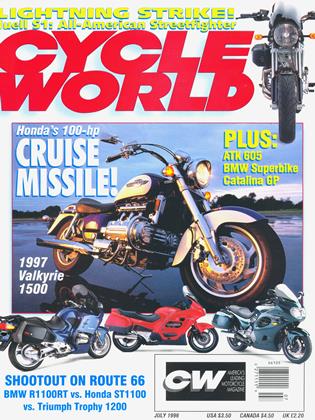ITALIAN SUPERBIKE REVIVAL
ROUNDUP
As CAGIVA PREPARES TO unveil its new four-cylinder F4, Aprilia toils on a 1000cc V-Twin and Moto Guzzi finalizes plans for an updated Daytona, another two of Italy's historic motorcycle marques are planning superbikes of their own.
Work is already under-way on Laverda's next-generation parallel-Twin, a liquid-cooled 750 that will debut in a modern update of the famous mid-1970s SFC cafe-racer at September's Cologne Show.
The new engine will retain the same crankcases as the cur rent air/oil-cooled Twin, but the top end will be all-new, al lowing it to displace a full 750cc; the current engine, which began life as a 500 more than 15 years ago, can be made no larger than 668cc.
Explains company boss Francesco Tognon, "By using the existing very strong bottom end, we can introduce a full 750cc twin-cylinder design very quickly, which will fit our existing chassis yet allow us to pass noise regulations in key markets like Switzerland and California. But our three-cylin der project is continuing at full speed, and we plan to launch a prototype superbike version at the next Milan Show in No vember, 1997."
Like Laverda, whose owner Tognon is a wealthy textile in dustrialist, Benelli has also been acquired by a bike-mad businessman who plans to use the millions he's made in an other industry to bankroll the historic marque's rebirth.
The businessman in question is 27-year-old Andrea Merloni, whose Gruppo Merloni is one of Europe's largest appliance manufacturers. Best known in the bike world as the owner of Team Gattalone, the team for which Pier-Francesco Chili be came the only privateer to win a World Superbike round in 1995, Merloni is a racer in his own right, having competed in the Italian Sport Production series from 1989-9 1.
Thus, Merloni's acquisition of the Benelli name is a logical first step toward building a World Superbike contender of his own-especially as one of his company's dozen factories is located in the old Benelli plant in the center of Pesaro. Benelli vacated the premises in 1980, moving into a modern factory on the outskirts of town, where then-owner Alessandro de Tomaso built small-capacity Moto Guzzis alongside a handful of Benellis. In 1992, de Toma so sold the Benelli name to local woodworking machin ery magnate Giancarlo Selci, who ironically began his working life sweeping-up in the Benelli factory. Selci's main interest, though, was in acquiring the modern plant to promote expansion of his machinery business; the hand ful of 50cc bikes built in a cor ner of it since then has only served two purposes: to keep the Benelli name alive and ready for a takeover deal such as this, and for tax reasons.
But Merloni's purchase of a majority shareholding in the company is quite a different matter. "For some time, I've been looking at ways of get ting involved in motorcycle manufacture," he says. "Benelli seemed the ideal op portunity-not least because I live locally, and can integrate it into my existing commit ments. I've only bought the Benelli name and a warehouse of spares for the old models, however, so we'll be starting completely from scratch."
Merloni says his first prod uct will be a 50cc scooter, the money from which will fund development of a range of multi-cylinder four-strokes. Target launch date for the first of these-a three-cylinder, 900cc superbike-is the Milan Show in November, 1999. Thus, Benelli will return to the world stage with a ma chine featuring half as many cylinders, yet twice the per formance, of the last four stroke to bear the company's name-the high, wide and questionably handsome six cylinder Sei.
Alan Cathcart













